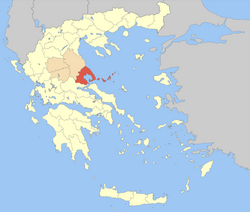This is the start of Ignatius's letter to the Magnesians.
Magnesia has a vast disambiguation on Wikipedia. It is mainly the region of Thessaly in Greece. There is also Magnesia on the Maeander in Anatolia/Asia Minor/Modern Turkey. This could be a plausible address for this letter as the previous letter was to the Ephesians and the disciples did great work in Asia Minor.
Also in Modern Turkey is Magnesia ad Sipylum in the region of Lydia, another Anatolian candidate for Ignatius's address. Apparently, Magnesia covers the boot of Greece and the edge of Turkey.
Ignatius tells them that he is determined to commune with the church there. He prays for a union of both the flesh and spirit of Jesus. I think this is odd language, but maybe he means that Christ's body on earth should observe a union with itself as it joins to Jesus in heaven. Or, since Jesus's body sits on the throne in heaven and his Spirit is here with us, perhaps Ig prays that Jesus will draw his earthly church to himself as it comes to worship him. It would also be good for different church units to behave as one and not as divided.
Apparently, Magnesia has a very young bishop, but Ig likes him as he has a knowledge of God the Father and the people should have a reverence for their superiors. The people there should not just be called Christians, but they must be so in reality. The must also remember that in honoring their young bishop that Christ is still the first Bishop and only High Priest by nature. Nobody sits in his place on earth. He only has representatives.
Sadly, Ignatius's language does give them impression that although he worships Christ alone, he does see the bishops as sitting in Christ's seat. Through the bishop, the congregants are "subject to God in Christ." He says that Christ does nothing without the Father, and so the church-goers should do nothing without the bishop. This leads to the blind following of priests and popes that we see today at the expense of what Christ actually said.
But as I will repeat for a while because I must, Ignatius still opposes Pope Francis today when he says of the martyrs, "They were persecuted, being inspired by grace to fully convince the unbelieving that there is one God." Know what the martyrs died for, Francis's statement is actually quite heinous and insulting to them. If all good people can come to salvation, even atheists, then clearly, faith in Christ is not necessary and these martyrs were uptight over nothing. The early Christians died because there is no church or salvation outside of Christ. They didn't allow the Romans to come in through the back door through Caesar or Jupiter. Their exclusivity cost them their lives, and Francis should be disciplined for his statement.
"For were he to reward us according to our works, we would cease to be. And in his seed all those have been blessed who were ordained to eternal life in Christ."
Another neat statement: Ig considers Sunday the 8th day of the week as it is the first day after the Sabbath when Jesus rose from the dead. More historical reasoning why Christians worship on Sunday and not Saturday. We are at rest. Now we truly can do good works.

No comments:
Post a Comment